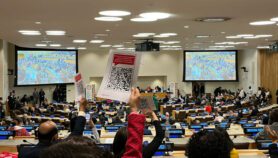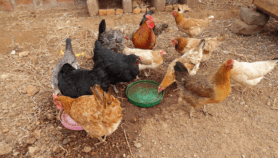Send to a friend
The details you provide on this page will not be used to send unsolicited email, and will not be sold to a 3rd party. See privacy policy.
[KAMPALA] For centuries, Ugandans have used herbs to treat the symptoms of malaria. Although experience shows that they are effective, their safety has never been tested.
Grace Nambatya-Kyeyune is determined to remedy this. Nambatya is director of research at the state-run Natural Chemotherapeutic and Research Laboratory (NCRL). Together with clinicians at Mulago hospital in Kampala, she is evaluating the toxicity of several herbal formulations used to combat malaria.
These are derived from three plants: Aristolochia elegans, known locally as kapapula or ‘little paper’, Vernonia amygdalina, commonly known as mululuza, and Artemesia annua, which was introduced to Africa from its native Asia.
The results of the clinical evaluation could give a green light to industrial production of anti-malarial drugs from plants extracts. According to Nambatya, if the herbal remedies are shown to be effective, the Ugandan National Drug Authority will register them as appropriate ‘drugs’ to fight malaria.
Nambatya says the remedies "clearly treat malaria", and explains that tests on people who have used them have shown that they do get rid of the parasite.
"But we’ve never known their clinical safety, particularly to very sensitive parts of the human body such as the brain, heart and liver," she says.
The clinical evaluations will also allow researchers to assess the effectiveness of the herbal remedies in a controlled fashion.
In preparation for the next step — producing herbal medicines on an industrial scale — Nambatya visited the United Kingdom in October 2004, to find investors and researchers studying anti-malarial plants willing to partner her laboratory.
Nambatya’s aim is to scale up extraction of key components from herbs that prove to be safe and effective and to mass-produce remedies based on them, so that they may be sold cheaply while retaining their quality. Eventually, she hopes they might even be exported to other needy countries.
In the United Kingdom, Nambatya visited Peter Wilde at the Coach House Group, a company aiming to develop technologies for sustainable development. Wilde is the inventor of a technology used to extract plant components, which can then be used to develop therapies.
"Their technology is a completely sealed system under vacuum comprising of a biomass extractor, an evaporator, a condenser and a freezer," says Nambatya of the technology she saw at Coach House in London. "It is fast, efficient and needs no heat source."
Along with HIV/AIDS, malaria is widespread in Uganda — so common it is accepted as ordinary to be infected by either.
"To be inflicted with malaria is considered normal and to go to a burial as a result is thought normal too," says health minister Jim Muhwezi. "We have to reject this situation because we do not have to be so sick or die so prematurely in such large numbers."
"Where then is Uganda on the journey to better health?" health minister Muhwezi asks. "We are still a very long away."
Nambatya has identified priority plants to research and process. She hopes to develop partnerships between Coach House, NCRL and the Ugandan government to exploit the curative properties of these plants and help her country on that journey.













